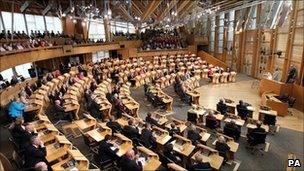New Holyrood powers on horizon
- Published
- comments

And so we have a further indication from the UK government of their readiness to enhance the powers of Holyrood via the Scotland Bill.
Today's announcements are relatively modest - although the power to issue bonds is of symbolic importance and was recognised as such by the cross-party committee convened by Wendy Alexander in the last Holyrood parliament.
Important because it is a further financial power and lessens the impression of dependence.
Symbolic because, as the Alexander committee recognised and practice elsewhere suggests, the bond market is not presently a particularly attractive option for governments seeking to raise funds.
In addition, Nick Clegg announced last week that the Scottish government can draw down money this year from anticipated future capital borrowing powers.
Alex Salmond, as we know, wants considerably more - including control of corporation tax and the Crown Estate revenue.
However, today's announcement at the very least signals that the UK government - including, crucially, the Treasury - maintains a close interest in updating and amending devolved powers, within the Union.
But here's a thought. Should the UK Government play a direct role in the forthcoming referendum on Scottish independence?
It is clear - and acknowledged by UK ministers - that the decision will be taken by the people of Scotland alone. But do UK ministers have a substantive role in influencing that decision?
As a government, that is, not as partisan individuals.
I have been confronted with two very different responses in the past few days.
Firstly, a UK minister told me, with considerable emphasis, that the government at Westminster was "not neutral" with regard to Scottish independence.
By contrast, at the weekend, in Scotland on Sunday, Duncan Hamilton, a former Nationalist MSP, argued that the view of UK ministers was "irrelevant".
Indeed, he extended that point to cover the prime minister and the leader of the opposition at Westminster. They should, he argued, "stay out of this campaign."
The argument is intriguing. I feel sure that my ministerial interlocutor was choosing words with care.
Prevailing circumstances
Consider our devolved neighbours over the water.
In 1990, Peter Brooke, then Conservative secretary of state, stated that Britain had no "selfish strategic or economic interest" in Northern Ireland.
Could such a statement be made now by the UK government with regard to Scotland? Would it be made?
I appreciate - trust me, I appreciate - that the history and the prevailing circumstances are rather different.
Northern Ireland was a Westminster creation at the time of partition. The Brooke statement was designed to reassure Nationalist and Republican opinion; to ease tension and promote peace.
It did not mean then - and has not meant since - that the government of the UK was detached from matters in Northern Ireland.
It was, however, a nod towards neutrality over the ultimate choice confronting the people as to their constitutional future.
In similar fashion, from the other perspective, Labour's Tony Blair later disavowed any suggestion that he would act as a "persuader" for a united Ireland.
Definitive end
That indication, in a 麻豆官网首页入口 interview in 1994, was interpreted at the time as Blair edging his party towards neutrality.
In essence, Duncan Hamilton is suggesting that the same bi-partisan approach should prevail from UK political leaders in the decision as to whether Scotland remains within that Union.
At this point, it seems highly unlikely that Mr Hamilton's appeal will be heeded.
Those UK leaders will argue that the case of Scotland is different by degree.
That independence for Scotland would mean the definitive end of the United Kingdom and, arguably, a measurable proportion of its international influence.
That, consequently, the UK Government cannot remain neutral.
However, it is at the very least intriguing to consider the argument and to ponder whether UK governmental intervention would achieve its stated objective.
Would it sway Scots towards the Union - or independence?